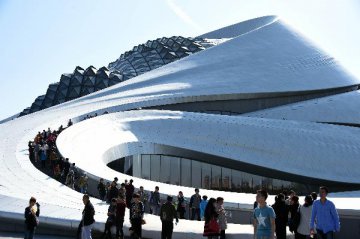by Duncan Murray
HONIARA, Solomon Islands, Oct. 15 (Xinhua) -- Despite its palm tree-lined shores and idyllic coral reefs, the Pacific nation of Solomon Islands remains relatively untouched in terms of tourism.
With an average of just 30,000 international visitors per year -- compared to Fiji's 1 million -- visitors to the Solomon Islands need only to take a few steps outside the capital of Honiara to find untapped natural beauty, friendly locals and millennia-old culture.
Thanks to the newly established diplomatic relationship between China and the Solomon Islands, more Chinese will now be able to experience this rare island paradise, roughly 2,000 km from Australia's northeast coast.
In a recent interview, Tourism Solomons CEO Josefa Tuamoto told Xinhua he hopes that the official friendship with China will help grow Solomon Islands tourism industry by raising the country's profile and stirring foreign investment.
However, he added that it is important for the industry to grow sustainably so as not to become commoditized, damaging the country's unique appeal.
China's coming into the destination will firstly push people to know about the Solomons, and it will probably attract Chinese investors into the destination also, Tuamoto said.
"But we need to develop in a way that we manage it properly so that we have a destination that everybody likes and that is sustainable for our children -- and that's essentially what we are trying to do at the moment."
To achieve a goal of 50,000 international visitors per year by around 2025 -- eventually expanding to 100,000, Tuamoto said the country needs at least another 1,000 hotel rooms to draw the attention of Chinese investors.
"The Chinese market is quite huge, both in terms of their economy and their ability to assist, so the Chinese investment is most welcome in that particular range."
Already appearing across the country's six major islands and more than 900 smaller landforms, are exclusive, boutique accommodation options which provide character-filled getaways for those looking to escape.
One such operation is the Ginger Beach Retreat which opened three years ago, 20 km from Honiara, on the main island of Guadalcanal.
Solomon Islands native Bernard Garo who co-owns Ginger Beach with his wife Bridget, explained to Xinhua that he runs the relatively small, three bungalow operation as an eco-hotel, seeking to preserve nature while also involving the local community.
"At Ginger Beach we are trying to promote ecotourism and community based development -- the overflow of what we have here, everybody around this community and this area are benefiting from," Garo said.
Garo employed and trained local people in day to day business operations, as well as in constructing and improving the guest facilities, all of which are in traditional Solomons style occupying a shaded garden area overlooking the beach.
The Ginger Beach Retreat also works with the Solomon Islands National University (SINU), taking students who are studying tourism and giving them practical insight and training in the field.
Garo told Xinhua that he welcomes more international visitors to the Solomon Islands and hopes that developing a sustainable and thriving tourism industry will take his country to new heights.
"Solomon Island is still an unexplored place, if you put it with Vanuatu and Fiji, there's a lot of tourists going to those places," Garo said.
"So they've seen Fiji and Vanuatu, but certainly not the Solomons, and I think that would be a bonus to the Solomon Islands."
Aside from the classic coconut in the sun and scuba diving tours on the reef, the Solomon Islands' main tourism commodity is, according to many, it's cultural DNA.
Most of those working in the tourism industry are determined not to lose that character while expanding international visitation, and if successful, they hope the Solomon Islands will remain a life changing destination for those lucky enough to experience it, for many generations to come.
"We will not be a run of the mill type destination, we will be a different destination because there's not many of us," Tuamoto said.
"If you want to immerse yourself in cultural identity, finding the people, and going away happy, this is the destination for you."




















Latest comments